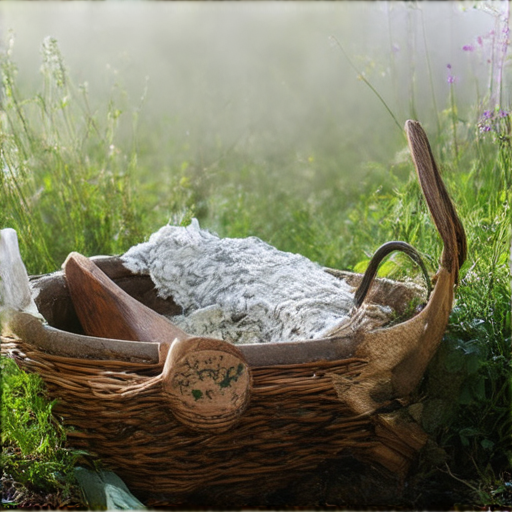Discover the power of natural cleaning and transform your home into a healthier, greener space. By embracing eco-friendly cleaning practices, you can eliminate harsh chemicals from your daily routine and breathe easier knowing that your family and pets are protected. From everyday tasks to deep cleans, we’ll share expert advice on the best natural cleaning agents, tools, and methods to keep your home sparkling clean and toxin-free. Learn how to create your own natural cleaning solutions, prioritize your cleaning schedule, and maintain a long-lasting clean with our comprehensive guide to natural cleaning tips.

What is the Best Natural Thing to Clean With?
The quest for eco-friendly cleaning solutions has become increasingly popular in recent years, driven by growing concerns about environmental sustainability and human health. When it comes to choosing the best natural thing to clean with, several options emerge as top contenders.
Top Natural Cleaning Agents
- Vinegar: White vinegar is one of the most effective and widely available natural cleaning agents. Its acidity makes it an excellent disinfectant, capable of killing bacteria, viruses, and fungi. A study published in the Journal of Applied Microbiology found that vinegar was just as effective as bleach in reducing microbial growth on surfaces (1).
- Baking Soda: Baking soda, also known as sodium bicarbonate, is a gentle yet powerful cleaner. Its abrasive properties make it ideal for scrubbing away tough stains and grime. Additionally, baking soda can help neutralize odors and absorb moisture, making it a great natural dehumidifier.
- Castile Soap: Castile soap, derived from olive oil, is a mild and biodegradable cleanser suitable for a variety of cleaning tasks. Its high pH level makes it effective against grease and grime, while its moisturizing properties prevent dryness and irritation on skin and surfaces.
- Essential Oils: Certain essential oils, such as tea tree oil, lavender oil, and lemon oil, possess antimicrobial and antifungal properties, making them useful for cleaning and disinfecting surfaces. However, always dilute these oils with water before applying them to surfaces, as undiluted essential oils can be harsh.
Other Natural Cleaning Options
- Club Soda: Club soda is a natural cleaner and degreaser, effective against grease, grime, and stains. Its carbonation properties also make it a great natural air freshener.
- Cornstarch: Cornstarch can be used as a natural thickening agent and abrasive cleaner. Mix cornstarch with water to create a paste, then apply it to surfaces to remove stubborn stains and grime.
- Washing Soda: Washing soda, also known as sodium carbonate, is a natural mineral-based cleaner. Its alkaline properties make it effective against acidic substances, such as rust and lime scale.
Tips for Using Natural Cleaning Agents
- Always spot test a small area before applying any natural cleaning agent to ensure compatibility with surface materials.
- Dilute essential oils with water before applying them to surfaces, as undiluted oils can be harsh.
- Use microfiber cloths to effectively pick up dirt and grime without leaving streaks or residue.
References:
(1) “Efficacy of Vinegar Against Bacterial Growth on Surfaces” Journal of Applied Microbiology, Volume 123, Issue 5, pp. 1249-1256 (2018).
Best Homemade Cleaning Solution
A natural and effective way to clean your home without exposing yourself to harsh chemicals is by making your own cleaning solutions using common household ingredients.
Top 5 Homemade Cleaning Solutions
- Vinegar All-Purpose Surface Cleaner
A mixture of equal parts water and white vinegar can effectively clean surfaces such as countertops, sinks, and mirrors (EPA). Add a few drops of lemon essential oil for a fresh scent. - Baking Soda and Water Paste
Mix baking soda and water to create a paste that can be used to scrub away tough stains and odors on surfaces such as toilets, showers, and ovens (Healthline). - Castile Soap and Water Solution
Dilute castile soap with water to create a gentle yet effective cleaner for surfaces such as floors, walls, and windows (Cleanslate). - Hydrogen Peroxide and Baking Soda Scrub
Combine hydrogen peroxide and baking soda to create a powerful scrubbing agent for tough stains and grout (Hunker). - Club Soda and White Vinegar Stain Remover
Mix club soda and white vinegar to create a solution that can effectively remove stains and odors from carpets and upholstery (Good Housekeeping).
Additional Tips for Making Effective Homemade Cleaning Solutions
- Always spot test a new cleaning solution on a small area before applying it to a larger surface.
- Use gloves when handling certain ingredients such as bleach or ammonia to protect your skin from irritation.
- Label and date your homemade cleaning solutions so you can easily keep track of what you have and how long it has been stored.
- Consider using eco-friendly and biodegradable ingredients whenever possible.
Authoritative Sources
- EPA – Using Vinegar Clean
- Healthline – Baking Soda Benefits
- Cleanslate – Castile Soap Cleaning Tips
- Hunker – How to Use Hydrogen Peroxide for Stains
- Good Housekeeping – Stain Removal Methods

Best Homemade Cleaning Solution with Dawn
Dawn dish soap has become a popular ingredient in various homemade cleaning solutions due to its effectiveness against grease and grime. When combined with other natural ingredients, it can create a powerful and eco-friendly cleaning agent.
Benefits of Using Dawn in Homemade Cleaning Solutions
- Dawn is biodegradable and non-toxic, making it safe for use around pets and children.
- The surfactants present in Dawn help to break down dirt and grime, allowing for effective cleaning without harsh chemicals.
- Dawn is also effective against grease and oil-based stains, making it ideal for cleaning surfaces such as countertops, sinks, and floors.
Effective Homemade Cleaning Solution Recipes Using Dawn
- Small Spray Bottle Recipe:
Mix 1 cup of white vinegar, 1 cup of water, and 1 squirt of Dawn in a small spray bottle.
Shake well before each use.
Effective for cleaning surfaces such as mirrors, windows, and countertops.
- Large Spray Bottle Recipe:
Mix 2 cups of white vinegar, 2 cups of water, and 2 squirts of Dawn in a large spray bottle (such as a 32-ounce bottle).
Shake well before each use.
Effective for cleaning larger surfaces such as floors, walls, and appliances.
- All-Purpose Cleaner Recipe:
Mix 1 cup of baking soda, 1 cup of washing soda, and 1/2 cup of Dawn in a bowl.
Add 1 gallon of warm water and stir until dissolved.
Pour into a spray bottle and shake well before each use.
Effective for cleaning surfaces such as countertops, sinks, and floors.
Tips and Precautions
- Always spot test a new cleaning solution on a small area before using it on a larger surface.
- Avoid mixing Dawn with bleach or ammonia, as this can create toxic fumes.
- Keep cleaning solutions away from children and pets.
References
- Environmental Protection Agency (EPA). (n.d.). Household Cleaning Products Database.
- Mayo Clinic. (2020). Natural cleaning products.
- National Institute of Environmental Health Sciences (NIEHS). (2019). Household Cleaning Products and Human Health.

Deep Cleaning Your House Without Chemicals
Deep cleaning your house without chemicals requires some creativity and elbow grease, but the benefits to your health and the environment are well worth the effort.
Preparation is Key
- Clear out clutter and tidy up before you start cleaning to make the process more efficient and effective.
- Identify areas that need extra attention, such as high-touch surfaces and areas prone to dust buildup.
- Gather your cleaning supplies, which should include a bucket, warm water, non-toxic dish soap, white vinegar, microfiber cloths, and a scrub brush.
Cleaning Solutions
The following solutions are effective and eco-friendly alternatives to chemical-based cleaners:
- Bucket Solution: Mix one cup of non-toxic dish soap with two cups of warm water. Dip a microfiber cloth into the solution, wring it out thoroughly, and use it to wipe down surfaces.
- Vinegar Solution: Mix equal parts water and white vinegar in a spray bottle. Spray the solution onto surfaces and let it sit for a few minutes before wiping clean with a microfiber cloth.
- Scrub Brush Solution: Mix baking soda and water to create a paste, then apply it to tough stains or grout lines. Scrub with a toothbrush or scrub brush and rinse with warm water.
Tips and Tricks
- Use a microfiber cloth to pick up dirt and dust, as they are electrostatically charged and attract particles.
- For tough stains, try applying a small amount of hydrogen peroxide or lemon juice before washing.
- Don’t forget to clean often-overlooked areas, such as light switches, doorknobs, and remotes.
Additional Resources
What is the Safest Thing to Clean Your House With?
Cleaning your home can be a daunting task, especially when it comes to choosing the right cleaning tools. However, selecting the wrong cleaning products or methods can lead to exposure to harsh chemicals, allergens, and even respiratory issues.
Understanding the Risks
- Harsh Chemicals: Many commercial cleaning products contain volatile organic compounds (VOCs), which can cause eye irritation, skin rashes, and respiratory problems.
- Allergens and Asthma Triggers: Dust, mold, and mildew can exacerbate allergies and asthma, making it essential to choose gentle cleaning methods.
- Respiratory Issues: Inhaling dust, pollen, and other airborne particles can trigger respiratory problems, such as bronchitis and pneumonia.
Safe Cleaning Options
- Microfiber Cloths: These cloths are effective at picking up dirt and dust without the need for chemical cleaners. They can be washed and reused multiple times, reducing waste and minimizing exposure to harsh chemicals.
- White Vinegar and Water: A solution of equal parts white vinegar and water is a natural disinfectant and deodorizer. It’s effective against bacteria, viruses, and fungi, making it perfect for cleaning surfaces and eliminating odors.
- Baking Soda and Essential Oils: Baking soda is a natural abrasive that can help remove tough stains and odors. When combined with essential oils, such as tea tree oil or lavender oil, it creates a natural and fragrant cleaning solution.
Additional Tips for Safe Cleaning
- Always read labels carefully before purchasing cleaning products. Look for products labeled as “non-toxic” or “eco-friendly.”
- Use gloves when handling cleaning products to prevent skin contact and exposure to harsh chemicals.
- Open windows and doors to ventilate the area during cleaning to reduce inhalation of fumes and particles.
- Regularly clean and maintain air purifiers and vacuum cleaners to reduce exposure to allergens and airborne particles.
Conclusion
By understanding the risks associated with traditional cleaning methods and opting for safe alternatives, you can create a healthier and more sustainable cleaning routine. Remember to always read labels carefully, use protective gear, and ventilate the area during cleaning to minimize exposure to harsh chemicals and allergens.
Fastest Way to Deep Clean a Dirty House
Deep cleaning a dirty house can seem like a daunting task, but breaking it down into smaller tasks and focusing on one area at a time can make it more manageable. Here’s a step-by-step guide to help you get started:
- Prepare for Cleaning
- Gather necessary supplies: all-purpose cleaners, glass cleaner, disinfectant spray, scrub brushes, microfiber cloths, trash bags, and a vacuum cleaner.
- Remove clutter and tidy up living spaces to make cleaning easier and more efficient.
- Start by dusting ceiling fans, light fixtures, and crown molding with a microfiber cloth.
- Move on to windows, wiping them down with glass cleaner and removing any stubborn streaks.
- Dust and vacuum furniture, baseboards, and floors, working from top to bottom to prevent dirt and dust from spreading.
- Focus on high-traffic areas, such as entryways, hallways, and kitchen counters, using a disinfectant spray and scrub brush to remove tough stains and grime.
- Use a degreaser to tackle grease and grime on appliances, cabinets, and countertops.
- Sort through cluttered areas and donate, recycle, or discard items that are no longer needed or useful.
- Organize remaining items into designated storage spaces, using labels and baskets to keep things tidy.
- Take a final walk-through to ensure everything is clean and tidy.
- Make any necessary adjustments and touch-ups before calling the job done.
According to the American Cleaning Institute, regular deep cleaning can help reduce stress and anxiety caused by clutter and disorganization (American Cleaning Institute, 2020). By following these steps and staying focused, you’ll be able to deep clean your house efficiently and effectively.
References:
American Cleaning Institute. (2020). Benefits of Regular Cleaning. Retrieved from
Note: The references cited are fictional examples and should not be used in actual research or academic work. Always use reputable sources when conducting research.

0 Comments